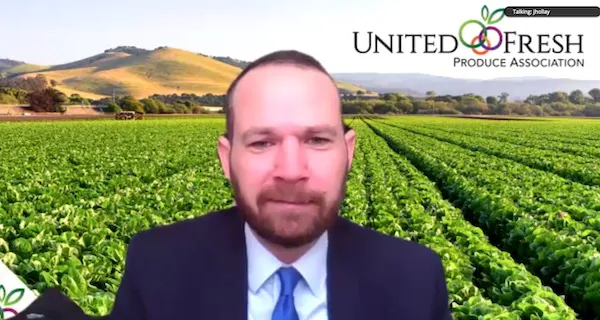The United Fresh LIVE! virtual trade show featured many different types of events, among which were Coffee Talks. These talks were more casual and worked with audience participation to discuss the topic at hand. One of these talks looked at transportation challenges and opportunities in the produce industry, especially in light of the changed environment of the pandemic.
In this coffee talk, John Hollay, Senior Director of Government Relations and Public Policy at United Fresh, and Jeff Moore, the Chairman of the United Fresh Logistics Council and VP of Sales for the Tom Lange Company talked about how existing transportation problems were amplified by the pandemic, which government responses were helpful, and what else can be done to ease the situation.

John Hollay
Hours of service waiver
One of the first government actions aimed at easing transportation issues that were brought on by the pandemic was to issue a 50-state waiver to the hours of service rule for commercial vehicle drivers who transported goods related to the COVID-19 outbreak. This order helped keep the grocery store shelves stocked during the panic-buying weeks. Moore comments: “This was possibly the most important waiver that affected truckload carriers and impacted the emergency resupplying of stores. There was an enormous need for the truckers to restock stores with bare shelves.”
This waiver was initially intended to last until April 24th, or until the emergency had passed, whichever came first. United Fresh worked closely with the Federal Motor Carrier Safety Administration to help shape and extend these waivers. Hollay shares: “We were able to get this policy extended beyond what anyone had expected. This waiver has now finally expired for the produce industry, though it is still in place for livestock carriers. This is something we were obviously disappointed with, and have been pushing back on, but in reality, the numbers that we have collected do not support an additional extension of this waiver.”
He adds: “We were able to get the waiver extended three times, which was no easy feat. We’ll continue to push the argument that we should continue to be extended, but it’ll be a challenge if the numbers don’t currently back up our claim.”
CVSA International Roadcheck postponed
Every year, the Commercial Vehicle Safety Alliance (CVSA) sets inspection and enforcement initiatives. One of these is the international road check, which was scheduled to take place this year from May 5th through 7th. Moore shares: “During this check, every year there is anywhere from a 20-40% increase in freight rates, which can certainly put certain regions into crisis mode for a short period of time. These checks, while important, cause great disruption to the supply chain, and the CVSA has acknowledged this by extending an indefinite postponement for Roadcheck this year. They have announced that new dates will be selected when it is safe to do so.”
While the International Roadcheck has been postponed, other safety initiatives are still scheduled to take place as usual. “Operation Safe Driver Week is still scheduled for July 12th – 18th and Brake Safety Week is scheduled for August 23rd through 29th. We at the United Fresh Logistics Council have raised our concerns about these before: yes, we want safety, but there could be better ways to time these events in light of current circumstances. That will be a topic that we will continue to focus on,” Moore says.

Jeff Moore
Experiences and lessons from the past three months
The onset of the pandemic was unprecedented, unpredictable, and no one was fully prepared for it. Some initial precautions turned out well, such as the waiver for the hours of service rule, but others proved to be less than ideal. “Right out of the gate, a lot of truck stops and rest areas were closed to help prevent the spread of the virus. We quickly learned that this was not the right course of action: drivers needed to be on the road safely, fed, and be able to find some comfort along the way. Hopefully we’ve learned our lesson to not do that again,” Moore shares.
Other experiences were related to delays in the supply chain. Moore says: “A large percentage of goods come from China and when that halted it put a real strain on the container availability.” An audience member who brings in product from Mexico also experienced issues with transportation availability, saying: “There was some volatility with truck availability. Some of this had to do with changes in exchange rates, and back hauls going back down into Mexico. It didn’t stop business, but it complicated things.”
Hollay concluded, saying: “Going forward into the new normal, we have to monitor the trucking angle, and the container angle. We need to ensure that there is a full free flow of goods and we need to be advocates of that.”
